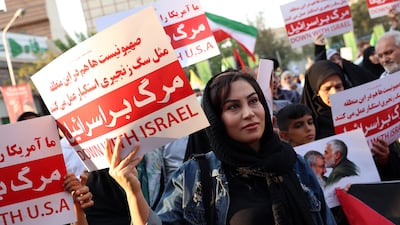The Palestine-Israel conflict inflames passions in the Middle East and beyond like no other issue. But from the international community’s viewpoint, there is a clear consensus over what the solution should be: the formation of a Palestinian state on Arab lands occupied by Israel during the 1967 war.
In recent months, leaders of the Arab world have reiterated their commitment to this plan, as have those in the West, Russia and China. But there has long been one major outlier: the Islamic Republic of Iran.
Since its establishment in 1979, the Iranian government has never stopped clamouring for the destruction of Israel. Its founder, the late Ayatollah Ruhollah Khomeini, famously called Israel “a cancerous tumour”. This isn’t just rhetoric. Iran arms and funds anti-Israel militias such as Hezbollah, Hamas and the Palestinian Islamic Jihad.
However, as with much else in Iranian politics, the internal dissent over this issue is mostly lost to outsiders. There is of course popular opposition to Iran’s anti-Israel position, but there are also forces within the ranks of government and inside influential political circles that are increasingly opposing conventional thinking.
The Iranian Reformist Front, an umbrella of reformist parties whose support was critical in the victory of President Masoud Pezeshkian this year, issued a statement condemning Israel’s recent attack on Iran. The statement calls for “initiative from the Iranian [government] to prevent a broader war … and bring about a ceasefire in Gaza and Lebanon”. It also declares that Israel’s attack on Iran “was a defeat in the public opinion for the Zionist occupying regime”.
While that is standard fare, it is noteworthy that the statement goes on to call for the “formation of an independent Palestinian state”. While this stops short of explicitly recognising Israel or identifying the 1967 borders, it strongly implies that. By calling for “calm in the region” and “development, progress and a better future for Iran”, the statement makes clear that, as Dr Pezeshkian has repeatedly said, it seeks to move Iran away from a warpath with Israel.
The reformist position is also noteworthy in light of another statement that led to huge controversy and backlash from hardliners.
On October 21, the Assembly of Lecturers and Scholars at Qom Seminary, a reformist-leaning body of clerics, issued a statement to condemn the Israeli attacks on Lebanon. But the statement also called for the “return of the Zionist regime to its legal borders prior to the 1967 aggression and formation of an independent Palestinian state”.
This open defence of the two-state solution led to repercussions for the organisation. Hardliners protested in front of the assembly’s offices in Qom following the Friday prayers. The Tehran-based hardline daily Kayhan called the assembly a “propaganda machine for the enemy” and described its “recognition of the fabricated regime of Israel” as “despicable and shameful”. It said the assembly was “countering Islam and supporting Zionists”.
Gholamhossein Mohseni Ejei, head of the Iranian judiciary, said the assembly was “taking measures that contradict security”, threatening it with prosecution. Another judicial official said the assembly could be dissolved because of its position. Its website has been shut down. Not to be left behind, the defeated hardline presidential candidate, Saeed Jalili, was also critical of the group.
Far from bowing to pressure however, the reformists have adopted an interesting strategy to defend their position. They have pushed back by raising two important facts: the occasional expression of support for the two-state solution by Hamas leaders; and, more crucially, Iran’s vote for a UN General Assembly resolution in October last year, which clearly endorsed the two-state solution.

Along with 120 other countries, the then administration of the late president Ebrahim Raisi voted yes to the Jordanian-initiated resolution that affirmed that “a just and lasting solution to the Israeli-Palestinian conflict can only be achieved by peaceful means … on the basis of the two-state solution”.
Azar Mansouri, head of the reformist front, said: “Since Iran gave a positive vote to a UN resolution that recognises the 1967 borders, what justification is there for all the attacks on the statement by the assembly?”
The journalist Ahmad Zeydabadi, in an editorial rebutting Kayhan’s attacks, pointed to statements from Hamas’s assassinated leader Ismail Haniyeh in support for negotiations aimed at achieving a two-state solution. “Was Haniyeh also ‘countering Islam and supporting Zionists’,” Zeydabadi asked rhetorically.
The hardliners’ criticism of the Qom assembly proves that the two-state solution continues to be a hot-button issue in Iran. But it also shows that within the country’s political circles and intelligentsia, there are those who openly favour this path and don’t share the prevailing anti-Israel agenda.
And for what it’s worth, Iran’s vote in the UN last year – as well as its support of a statement issued by the Organisation of Islamic Co-operation that called for a two-state solution – demonstrates an appetite for compromise in Tehran.
The diplomatic language that followed a month after the UN vote is just as instructive. Former foreign minister Kamal Kharrazi, who currently advises supreme leader Ayatollah Ali Khamenei, said the government remains opposed to the two-state solution – despite the vote – yet won’t stand in the Palestinian people’s way were they to adopt this position.
As embattled as the two-state solution is today, it continues to be the bedrock of the international community’s approach to resolving the Palestine-Israel conflict. As the raging debate in Tehran shows, it also has its fair share of proponents inside Iran.


